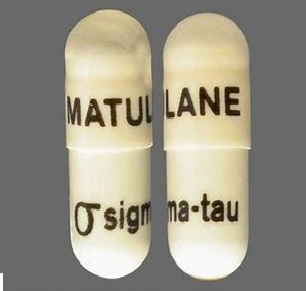Matulane
Generic name: procarbazine [ pro-CAR-ba-zeen ]
Drug class: Miscellaneous antineoplastics
What is Matulane?
Matulane is given with other cancer medicines to treat Hodgkin's Disease (a type of blood cancer).
Matulane may also be used for purposes not listed in this medication guide.
Matulane side effects
Get emergency medical help if you have signs of an allergic reaction: hives; difficult breathing; swelling of your face, lips, tongue, or throat.
Matulane may cause serious side effects. Call your doctor at once if you have:
-
diarrhea that is watery;
-
numbness, burning pain, or tingly feeling;
-
confusion, hallucinations, problems with vision or speech, trouble with walking or daily activities;
-
feeling unsteady, loss of balance or coordination;
-
tremors, seizure;
-
cough, chest pain, trouble breathing;
-
blisters or ulcers in your mouth, red or swollen gums, trouble swallowing;
-
bloody or tarry stools, coughing up blood or vomit that looks like coffee grounds;
-
liver problems--loss of appetite, stomach pain (upper right side), tiredness, itching, dark urine, clay-colored stools, jaundice (yellowing of the skin or eyes); or
-
low blood cell counts--fever, chills, easy bruising, unusual bleeding, pale skin, cold hands and feet, feeling light-headed or short of breath.
Common side effects of Matulane may include:
-
low blood cell counts; or
-
nausea, vomiting.
This is not a complete list of side effects and others may occur. Call your doctor for medical advice about side effects. You may report side effects to FDA at 1-800-FDA-1088.
Related/similar drugs
Keytruda
Keytruda is used to treat multiple types of cancer such as melanoma, non-small cell lung cancer ...
Avastin
Avastin is used to brain tumors and cancers of the kidney, colon, rectum, or lung. Learn about side ...
Botox
Botox is used to treat chronic migraines, excessive sweating, bladder conditions, eye muscle ...
Opdivo
Opdivo is used to treat many different types of cancer such as melanoma, non-small cell lung ...
Warnings
Matulane can increase your risk of bleeding or infection. Call your doctor if you have unusual bruising or bleeding, or new signs of infection (fever, chills, mouth sores, pale skin).
Before taking this medicine
You should not take Matulane if you are allergic to it, or if you have bone marrow suppression.
Tell your doctor if you have ever had:
-
kidney disease;
-
anemia (low red blood cells);
-
low levels of platelets in the blood;
-
low white blood cell counts;
-
fluid retention; or
-
if you have received other cancer medications or radiation within the past 30 days.
Matulane may harm an unborn baby. Use effective birth control to prevent pregnancy, and tell your doctor if you become pregnant.
Matulane may affect fertility (ability to have children) in men.
You should not breastfeed while you are taking Matulane.
How should I take Matulane?
Follow all directions on your prescription label and read all medication guides or instruction sheets. Use the medicine exactly as directed.
Matulane can increase your risk of bleeding or infection. You will need frequent medical tests. Your cancer treatments may be delayed based on the results of these tests.
Store at room temperature away from moisture, heat, and light.
What happens if I miss a dose?
Take the medicine as soon as you can, but skip the missed dose if it is almost time for your next dose. Do not take two doses at one time.
What happens if I overdose?
Seek emergency medical attention or call the Poison Help line at 1-800-222-1222.
Overdose symptoms may include vomiting, diarrhea, tremors, or feeling lightheaded.
What should I avoid while taking Matulane?
Do not drink alcohol. Unpleasant side effects could occur.
Avoid being near people who are sick or have infections. Tell your doctor at once if you develop signs of infection.
Do not receive a "live" vaccine while using Matulane. The vaccine may not work as well and may not fully protect you from disease. Live vaccines include measles, mumps, rubella (MMR), rotavirus, typhoid, yellow fever, varicella (chickenpox), zoster (shingles), and nasal flu (influenza) vaccine.
Avoid eating foods that are high in tyramine, including:
-
avocados, bananas, figs, papaya, raisins, and sauerkraut;
-
dried, aged or fermented meats;
-
wine, beer on tap (not in a bottle or can);
-
aged cheeses, including blue, boursault, brie, camembert, cheddar, gruyere, mozzarella, parmesan, Romano, Roquefort, and Swiss;
-
soy sauce, miso soup, bean curd, fava beans; or
-
yeast extracts, yogurt.
Eating tyramine while you are taking Matulane can raise your blood pressure to dangerous levels, causing life-threatening side effects.
Avoid smoking during your treatment. Smoking may increase your risk of lung cancer while taking Matulane.
What other drugs will affect Matulane?
Using Matulane with other drugs that make you drowsy can worsen this effect. Ask your doctor before using opioid medication, a sleeping pill, a muscle relaxer, or medicine for anxiety or seizures.
Tell your doctor about all your other medicines, especially:
-
blood pressure medication;
-
an antidepressant or sedative;
-
diet pills, stimulants, or ADHD medication such as Adderall or Ritalin; or
-
medicine to treat mental illness or psychosis.
This list is not complete. Other drugs may affect Matulane, including prescription and over-the-counter medicines, vitamins, and herbal products. Not all possible drug interactions are listed here.
More about Matulane (procarbazine)
- Check interactions
- Compare alternatives
- Pricing & coupons
- Drug images
- Side effects
- Dosage information
- During pregnancy
- Drug class: miscellaneous antineoplastics
- En español
Patient resources
Professional resources
Related treatment guides
Further information
Remember, keep this and all other medicines out of the reach of children, never share your medicines with others, and use this medication only for the indication prescribed.
Always consult your healthcare provider to ensure the information displayed on this page applies to your personal circumstances.
Copyright 1996-2025 Cerner Multum, Inc. Version: 6.01.

